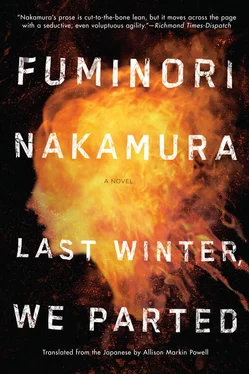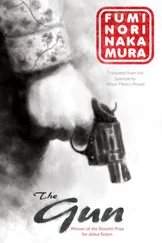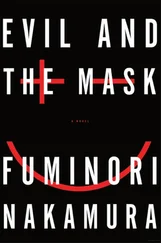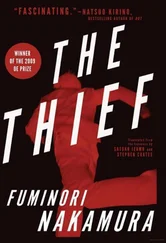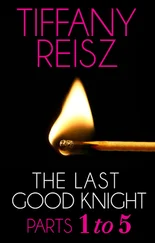“… I’m a little late. Uh …”
“No, it’s fine. Thank you for coming.”
Katani had been in graduate school researching mathematics, but he had quit suddenly, got his certification in accounting, and is now working for a mid-sized auto parts manufacturer. His hair is trimmed short, and he has a thin beard. He looks like one of the young people these days who are concerned about their appearance. He is tall.
Katani orders a caffè latte. I put my cigarette out.
“Um … Actually, I almost didn’t come.”
Katani shifts his gaze slightly downward.
“You’re writing … a book about him? Will my name be in the book too?”
“I’ll use an alias. You can also check the manuscript before it’s published. If for any reason you object to something I’ve written, you can say so … Do you mind if I record this?”
Katani looks at the silver recorder on top of the table. It catches the light in the coffee shop with a cold gleam.
“Well … is it a problem if you don’t?”
“No, not at all.”
The waitress sets Katani’s coffee on the table. It should have been a caffè latte, but Katani doesn’t say anything.
“… You’ve known Kiharazaka since you were elementary school students, right?”
“… Yes.”
“What was your impression of him back then?”
“Hmm.”
Katani puts his hand in his pocket and abruptly withdraws a cigarette and lights it. He exhales the smoke. Calmly, quietly.
“Well, uh …” He speaks with a certain determination. “Why are you writing a book about him?”
He looks me directly in the eye until it seems he can’t stand to anymore, and then he drops his gaze. The waitress passes by his side. Her white legs stick out under her short skirt.
“Because it’s what I decided to do.”
“But why? Are you fascinated by him? He …”
As he speaks, he meets my gaze again, then looks down again.
“He burned two women to death.”
The coffee shop is poorly lit. I wonder why I chose this place.
“Akiko Yoshimoto and Yuriko Kobayashi. They were both so young. Why write a book about a man like that?”
“… Because I have my doubts.”
“About what?”
I light my own cigarette. I exhale the smoke. As if that is all I can manage. Katani goes on before I say anything.
“… I had a bad feeling. He had transferred his obsession with his sister onto butterflies. That would have been fine. But then it shifted to dolls, before finally coming back to people. I thought it was risky. He put too much of himself into his photographic subjects. I recognize that’s precisely what made him a brilliant artist. But it’s a thin line, and dangerous if he were to cross it.”
I am silent. Katani starts to speak again.
“Shall I guess what your doubts are?”
He is no longer looking at me. He keeps his gaze down.
“Why would Kiharazaka have murdered and burned his beloved photographic subjects? No, that’s not quite right … It’s horrific, but here is probably where your doubts really lie. When those subjects, I mean, when those women were on fire, why didn’t Kiharazaka photograph the scene ?… Isn’t that it? Especially if that was the reason why he burned them in the first place.”
I am positively speechless. I can feel sweat break out on my back.
“Are you familiar with the story by Ryūnosuke Akutagawa called ‘Hell Screen’?”
I nod.
“It tells the tale of a crazed painter, who watches as his own daughter literally burns to death, and then he paints the scene. Afterward the painter commits suicide, but the folding screen that he leaves behind, with its depiction of hell, evokes a terrific artistry … Is this what you had in mind? If that were the case — if it were the mad act of a person crazed with his art — in a way it would be easier to understand. But that’s not what he did. He simply burned them. Despite the fact that he was an artist, he didn’t take a single photograph.”
No longer able to stand it, I tear my gaze away from Katani for a moment and from a distance catch the eye of the waitress. Not having been listening to our conversation, she smiles. Unsuspectingly.
“… I studied mathematics at university. I mentioned Akutagawa just now — I became interested in him and read some of his work because he had said that his writing required certain mathematical skills … Still, there is something familiar to me about that thin and dangerous line … Numbers are beautiful. They seem to line up coherently, but behind their logic lies an overwhelming chaos. And there is a pleasure to be found in proceeding to create beautiful order out of that chaos … Only, I knew the limits. I don’t mean something as simple as the limits of my own mathematical ability. I mean the limits of my brain. Have you ever grasped the limits, not of your own skills, but of your brain’s capabilities?”
“… I don’t think so.”
“Most people are unaware of the true limits of their own brain. In reality, though, what would they do with that knowledge anyway? In certain areas of expertise, it’s necessary to use the brain at the utmost limits of human potential … There’s a fear of knowing just what that is. The brain tries to deny its own limits. Then numbers get distorted. Once, among the numbers, I discovered a formula that shouldn’t have existed … It really was an odd formula. Not a breakthrough — because the equation was flawed, you see. But I realized that I was obsessed with the flaw itself. I was delirious with joy. That joy enabled me to keep working on the flawed equation, which brought me into strange territory. I was thrilled when I realized it . I was able to leave mathematics … To this day, I still wonder what the hell that damn formula was about.”
Katani suddenly falls silent, as if he realizes he talked too much and is embarrassed. Or perhaps he is distracted by something serious. I think if I don’t speak he won’t say anything more.
“… Kiharazaka’s photograph, Butterflies …”
He doesn’t respond to what I say. Despite the fact that a moment ago he had been speaking with such enthusiasm.
“For me, there’s something about that photo of his … This all started when my editor asked if I might be interested in writing about him. That’s how it happened, no dramatic connection. But then, just … when I looked at that photo, I realized I was on the verge of a morbid fixation on it. So the concept of writing a book on him is simply expanding the original assignment, taking it far beyond.”
He still doesn’t respond. It seems as though he might have regressed to the time when he was doing mathematics.
“I was interested in the man who took that photograph. Then I looked at the archives that were supplied to me. Both women were murdered. When the first incident happened, the fire was not treated as arson — but after the second murder, it became clear that he was responsible for both. It’s not as if one could be deemed an accident and the other a murder … It’s just like you said. I have various doubts, and that’s one of them — why aren’t there any photos of the corpses burning? Wouldn’t an artist like him — one who sought out the bizarre — have been expected to take pictures?”
“I think you may have missed …” he says suddenly. “The relevant point here … You’re subtly avoiding the question. What I wanted to know was, why are you writing this book? You said it was because there was something about that photograph. But that’s just the semblance of an answer — there’s nothing substantial about it. Pay attention to what I’m asking you now. What was it that drew you to that photograph? I would like you to explain by focusing on the question of what it was exactly. I expect the real answer is to be found there.”
Читать дальше
